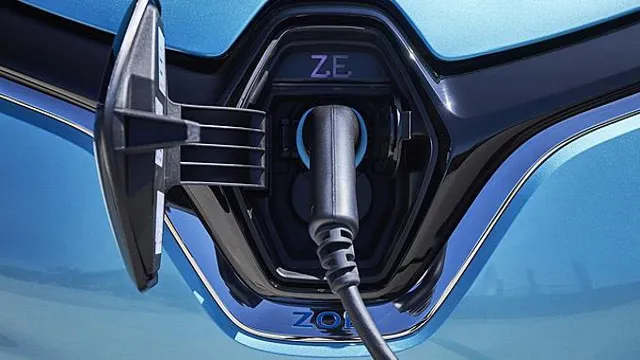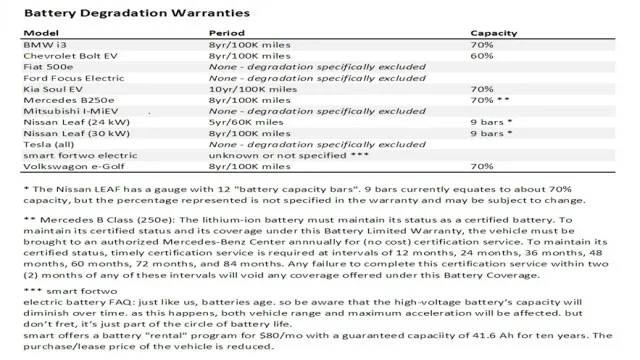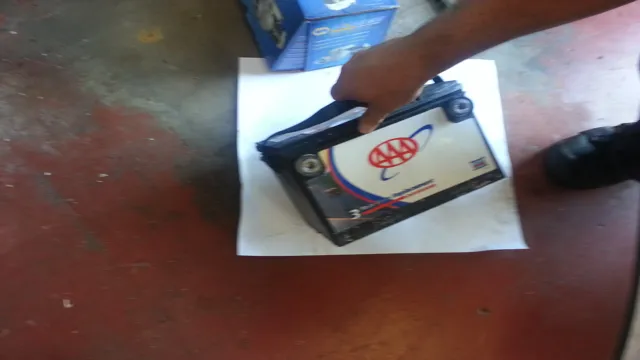Unleashing the Power of Electric Cars: Understanding Battery Warranty in Detail
Have you ever wondered about the warranty of electric car batteries? It’s no secret that an electric car’s battery is its most crucial component, and the cost of replacing it can be quite daunting. So, it’s only reasonable to consider your options and be well-informed about what your warranty covers. Electric car battery warranties not only vary between manufacturers, but also from model to model.
This can make navigating the fine print quite challenging. But fear not, because in this blog, we will delve into the world of electric car battery warranties and provide you with all the information necessary to make an informed decision. So, buckle up and let’s get started!
Types of Battery Warranties
When it comes to buying an electric car, one of the most important aspects to consider is the battery warranty. There are different types of battery warranties that vehicle manufacturers offer, which can vary in coverage and duration. One common type is the standard warranty, which typically covers the battery for a certain number of years or miles, whichever comes first.
Another type is the extended warranty, which can provide additional coverage beyond the standard warranty period. Some vehicle manufacturers may also offer a separate warranty specifically for the battery, which can provide more comprehensive coverage for a longer period of time. Regardless of the type of battery warranty, it’s important to read and understand the terms and conditions to ensure that you have adequate coverage and protection for your electric car’s battery.
So if you’re in the market for an electric car, be sure to do your research and compare the battery warranty options available to you.
Manufacturer Warranty vs. Extended Warranty
When it comes to battery warranties, there are typically two types: manufacturer warranties and extended warranties. Manufacturer warranties come with the purchase of a battery and cover any defects or malfunctions that may occur within a certain timeframe. On the other hand, extended warranties are purchased separately and typically provide coverage beyond the manufacturer’s warranty period.
While manufacturer warranties are often enough for most consumers, those who rely heavily on batteries may opt for an extended warranty for added protection and peace of mind. It’s important to carefully read and understand the terms and conditions of both types of warranties to ensure that you’re getting the coverage you need. Overall, having a warranty can save you money and prevent the headache of having to replace a faulty battery on your own.

Coverage and Limitations
Battery warranties come in different types, each with its own coverage and limitations. The most common types of battery warranties are prorated, non-prorated, and performance. A prorated warranty means that the battery manufacturer will cover a certain percentage of the cost for a replacement battery based on the remaining months of the warranty period.
Non-prorated warranties, on the other hand, cover the full cost of a replacement battery but only for a certain period. Finally, performance warranties cover batteries that fail to meet certain performance standards, such as a minimum level of power output. Understanding the type of battery warranty offered by a manufacturer is crucial in determining the coverage and limitations of the warranty.
It is also important to read the fine print carefully to ensure that you understand what is covered and what is not, as well as any conditions that may void the warranty. Keeping these factors in mind can help ensure that you get the most out of your battery warranty.
Average Battery Life and Warranty Length
When it comes to electric cars, one of the biggest concerns that many people have is the battery life. The good news is that most electric car batteries are designed to last for several years, with an average range of 100,000 to 200,000 miles. However, it’s important to note that the battery life can depend on a variety of factors, including how often the car is charged, the driving conditions, and even the climate.
When it comes to the warranty length for electric car batteries, most manufacturers offer warranties that cover the battery for at least eight years or 100,000 miles, whichever comes first. Some manufacturers even offer longer warranties for their batteries, with Tesla’s Model S and Model X batteries being covered for up to eight years or unlimited miles. One thing to keep in mind is that the warranty for the battery does not necessarily cover the entire electric car.
It’s important to check with the manufacturer to see what is covered under the warranty and what is not. Additionally, some manufacturers may offer extended warranties for an additional fee. In conclusion, the battery life and warranty length for electric cars vary depending on a variety of factors.
While most batteries are designed to last for several years, it’s important to take care of the battery and follow the manufacturer’s guidelines for charging and maintenance. When purchasing an electric car, it’s also important to check with the manufacturer to see what is covered under the warranty and to consider purchasing an extended warranty for added protection.
Industry Standard for Electric Car Battery Life
When it comes to electric cars, one of the primary concerns for drivers is the lifespan of the battery. On average, electric car batteries are designed to last anywhere from 8 to 10 years, or roughly 100,000 miles. However, this can vary depending on a number of factors, such as the make and model of the vehicle, the driving habits of the owner, and the overall quality of the battery.
To give drivers peace of mind, most electric car manufacturers offer warranties on their batteries, which typically range from 8 to 10 years or 100,000 to 150,000 miles. This means that if the battery fails within that time frame, the manufacturer will replace it, free of charge. It’s important to note, however, that the warranty may not cover issues caused by neglect or misuse, so it’s important to take proper care of your electric car battery to ensure it lasts as long as possible.
Length of Battery Warranties for Major Electric Car Brands
When it comes to purchasing an electric car, one of the main aspects to consider is the battery life and warranty. After all, the battery is one of the most expensive components in an EV, and replacing it can be a significant expense. So, what is the average battery life, and how long are the warranties for the major electric car brands? The average battery life for an EV ranges from 8 to 10 years, but some batteries can last up to 20 years, depending on usage and maintenance.
As for warranties, it is essential to note that they differ from brand to brand. On average, the battery warranties for major electric car brands range from 8 to 10 years or 100,000 to 150,000 miles, whichever comes first. Some brands, such as Tesla, provide an 8-year, unlimited-mileage warranty on their battery systems.
It is crucial to compare battery warranties when shopping for an EV and to consider factors such as battery capacity degradation and other limitations. Overall, the battery life and warranty can significantly impact the ownership experience of an electric car, and it is essential to do thorough research before making a purchase.
Factors Affecting Battery Life and Warranty
When it comes to electric cars, one of the main concerns for potential buyers is the battery warranty. As the battery is the heart of the vehicle, it is natural to want to ensure that it will last for as long as possible. Several factors can impact the lifespan of an electric car battery and, in turn, affect the warranty provided by the manufacturer.
Firstly, extreme weather conditions, such as high temperatures or very cold temperatures, can reduce the battery’s efficiency and, therefore, its overall lifespan. Secondly, the battery’s charging behavior can also have a significant impact. For example, fast charging frequently can cause accelerated wear and tear on the battery, which may affect the warranty.
Additionally, the overall usage of the car, including speed, regularity of use, and load, can also wear down the battery. When looking into purchasing an electric car, it is essential to consider these factors and compare warranty offers from different manufacturers to make an informed decision.
Driving Habits and Conditions
One of the most crucial factors affecting the life of your car battery is your driving habits and conditions. Harsh driving conditions like extreme heat or cold, short trips, or constant stop-and-go traffic can take a real toll on your battery. If you frequently take short trips or use a lot of electrical accessories like the radio or air conditioner, your battery may not have enough time to recharge fully.
On the other hand, longer trips at higher speeds give your battery a chance to recharge fully, which helps keep it healthy. Additionally, aggressive driving habits like hard braking and accelerating or frequent speeding can also put more strain on your battery, leading to a shorter lifespan. Keep in mind that warranty policies for car batteries also differ depending on the manufacturer.
Some brands may offer longer warranties for their batteries, but these policies may also have specific conditions you need to meet for your warranty to be valid. To maximize the life of your car battery, it’s important to understand how your driving habits and warranty policy affect it.
Maintenance and Care
When it comes to the lifespan of a battery, there are a variety of factors that can impact its longevity and warranty coverage. One of the most significant aspects to consider is how often and how deeply the battery is discharged, as repeated deep discharges can damage the battery’s overall health over time. Other elements that can impact battery life include the temperature at which the battery is stored or operated, the frequency of charging cycles, and the quality of the battery itself.
It’s important to note that, even with proper maintenance and care, batteries will eventually begin to degrade and lose capacity over time. As a result, understanding the warranty terms and coverage of your battery can be key to avoiding costly repairs or replacements down the road. By paying attention to these important factors, you can help ensure that your battery remains in top condition for as long as possible, ultimately helping to extend both its lifespan and usability.
Pros and Cons of Battery Warranties
If you’re purchasing an electric car, it’s important to consider the battery warranty. A battery warranty is a guarantee that covers your vehicle’s battery for a specific period of time. It’s important to know the pros and cons of battery warranties before making a decision.
Some of the benefits of battery warranties include peace of mind, the potential cost savings on repairs, and an indication of the manufacturer’s confidence in their product. On the other hand, there may be limitations on the warranty, such as the type of damage or usage that is covered. Additionally, some battery warranties may be shorter than the overall vehicle warranty.
Ultimately, it’s important to carefully review the warranty details and consider your driving habits and needs before making a decision. If you do decide to purchase a vehicle with a battery warranty, be sure to follow any maintenance guidelines to ensure the warranty remains valid. Overall, a battery warranty can provide added protection for your electric car, but it’s important to understand the limitations and requirements.
Costs and Benefits
When it comes to battery warranties, there are pros and cons that should be considered before making a purchase. On the one hand, a battery warranty can provide peace of mind knowing that you won’t have to pay for a replacement if something goes wrong. On the other hand, some warranties may come with high costs and strict conditions, making them less worthwhile.
It’s important to read the terms and conditions carefully and consider the cost-benefit ratio before making a decision. Additionally, it’s important to consider the reliability and reputation of the company offering the warranty to ensure that they will uphold their end of the bargain. Ultimately, a battery warranty can be a useful investment if chosen wisely, but it’s important to weigh the costs and benefits carefully.
Peace of Mind vs. Unlikely Failure
When it comes to purchasing a battery, warranties can provide peace of mind but also carry some drawbacks. On one hand, a warranty can give you confidence that your battery will last for the specified time frame. However, it’s important to note that batteries are unlikely to fail within the first few years of use.
Thus, paying extra for an extended warranty might not be worth the cost. Additionally, some warranties may have fine print and exclusions that make it difficult to make a claim when needed. It’s important to carefully read the terms of any warranty before making a purchase.
Ultimately, while a warranty can offer reassurance, it’s important to weigh the costs and potential drawbacks to decide whether it’s worth the extra expense.
Conclusion
In conclusion, the battery warranty on electric cars is like the perfect outfit for your phone – it gives you the confidence to charge ahead knowing that your battery is protected. It’s the cherry on top of the electric car sundae, ensuring that your eco-friendly ride will last you for years to come. So, go ahead and plug-in with peace of mind, because with a solid battery warranty, you’ll be driving into the future with a smile on your face and a fully charged battery at your fingertips.
“
FAQs
What is the typical length of a battery warranty on electric cars?
The length of a battery warranty on electric cars can vary, but it typically ranges from 8 to 10 years.
Is the battery warranty transferable to a new owner if I sell my electric car?
It depends on the manufacturer, but many electric car battery warranties are transferable to new owners.
What does the battery warranty cover?
The battery warranty typically covers defects and malfunctions in the battery pack, as well as degradation over time. However, it may not cover damage caused by accidents or improper use.
Will I need to pay for any battery replacements or repairs during the warranty period?
If the battery fails due to a covered defect or malfunction, the warranty should cover the cost of repair or replacement. However, if the battery fails due to damage or improper use, you may be responsible for the cost of repairs or replacement.





